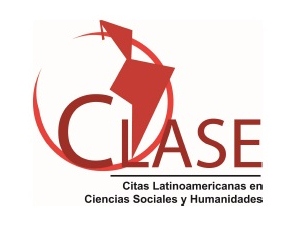Teorías de la composición discursiva en la Antigüedad griega
Perspectivas sistemáticas, asistemáticas y proyecciones
Resumen
Este trabajo se propone identificar las concepciones sobre la composición discursiva que surgen en la Antigüedad griega y que tienen proyecciones y continuidades en la historia de la composición escrita. Partimos de un rastreo y análisis de fuentes antiguas, en particular, obras literarias, tratados de retórica y discursos oratorios griegos para detectar grandes lineamientos generales sobre el modo de construcción de un discurso, sobre todo, argumentativo, pero también de otros géneros como el literario. Determinamos que en la Antigüedad griega se elaboran dos grandes corrientes, que denominamos “asistemática” y “sistemática”: la línea asistemática atribuye la construcción discursiva a agentes extrahumanos o factores ininteligibles; la perspectiva sistemática concibe la composición como un mecanismo procesual regulado por reglas flexibles, que puede ser enseñado y aprendido. Este estudio intenta aportar a la detección de lineamientos generales sobre la composición (oral o escrita) en la Antigüedad griega y a determinar algunas proyecciones en el campo de la didáctica de la escritura, en particular, en teorías procesuales de la escritura de orientación contrapuesta (p. ej. los modelos cognitivos y los “expresivistas”), que permiten vislumbrar la dimensión histórica de concepciones actuales.Citas
Berlin, J. A. (1987). Rhetoric and Reality: Writing Instruction in American Colleges, 1900 - 1985. Carbondale, Edwardsville: Southern Illinois University Press.
Bruner, J. S. (1999 [1960]). The process of education. Cambridge, Massachusets: Harvard University Press.
Burnet, J. (ed.). (1903). Platonis Opera (5 vols.). Oxford: Oxford University Press.
Cole, T. (1991). The origins of rhetoric in ancient Greece. Baltimore, London: Johns Hopkins University Press.
Covino, W. A. (2001). “Rhetorical Pedagogy”. En G. Tate, A. Rupiper y K. Schick (eds.). A Guide to Composition Pedagogies (pp. 36-53). Oxford, New York: Oxford University Press.
Delgado, C. (2010). “Inspiración” y “entusiasmo” en la poetología platónica: expresiones relativas al estado epistémico del poeta. Circe clásicos y modernos, 14 (1), pp. 35-49.
Dodds, E. R. (1999 [1951]). Los griegos y lo irracional (trad. Araujo, M.). Madrid: Alianza.
De Romilly, J. (1975). Magic and Rhetoric in Ancient Greece. London: Harvard University Press.
Elbow, P. (1973). Writing Without Teachers. London, Oxford, New York: Oxford University Press.
Enos, R. L. (2020). “Ancient Greek Writing Instruction and Its Oral Antecedents”. En J. J. Murphy y Ch. Thaiss (eds.) (4ta. ed.). A Short History of Writing Instruction. From Ancient Greece to the Modern United States (pp. 8-39). New York, London: Routledge.
Faigley, L. (1986). Competing Theories of Process: A Critique and a Proposal. College English, 48 (6), pp. 527-542.
Flower, L. y J. Hayes. (1980). “Identifying the organization of writing processes”. En L. W. Gregg y E. R. Steinberg (eds.). Cognitive Processes in Writing: An Interdisciplinary Approach (pp. 3-30). Hillsdale: Lawrence Erlbaum.
Flower, L. y J. Hayes. (1981). A Cognitive Process Theory of Writing. National Council of Teachers of English, 32 (4), pp. 365-387.
Forster, E. S. y D. J. Furley (eds., trads.). (1955). Aristotle. On Sophistical Refutations. On Coming-to-be and Passing Away. On the Cosmos. Cambridge, MA: Harvard University Press.
Fortenbaugh, W. W. (2007). “Aristotle’s Art of Rethoric”. En I. Worthington (ed.). A. Companion to Greek Rhetoric (pp. 107-123). Oxford: Blackwell.
Gagarin, M. (1994). “Probability and persuasion: Plato and early Greek rhetoric”. En: I. Worthington (ed.). Persuasion. Greek Rhetoric in Action (pp. 46-68). London, New York: Routledge.
Gil, L. (1967). Los antiguos y la “inspiración” poética. Madrid: Guadarrama.
Guthrie, W. K. C. (1990 [1962]). Historia de la filosofía griega IV. Platón. El hombre y sus diálogos: primera época (trad. Vallejo Campos, A. y Medina González, A.). Gredos: Madrid.
Havelock, E. A. (1994 [1963]). Prefacio a Platón (trad. Buenaventura, R.). Madrid: Visor.
Havelock, E. A. (1996 [1986]). La musa aprende a escribir. Reflexiones sobre oralidad y escritura desde la Antigüedad hasta el presente (trad. Brediow Wenda, L.). Barcelona, Buenos Aires, México: Paidós.
Horner, B. y M.-Z. Lu. (2009). “Rhetoric and (?) Composition”. En A. A. Lunsford, K. H. Wilson y R. A. Eberly (eds). The SAGE handbook of rhetorical studies (pp. 293-315). Thousand Oaks, California: Sage.
Jaeger, W. (1995 [1933]). Paideia. Los ideales de la cultura griega (trad. Xiral, J. y Roces, W.). Ciudad de México: Fondo de cultura económica.
Johansen, Th. K. (2001a). “Introducción”. En Th. K. Johansen (ed.). Productive Knowledge in Ancient Philosophy: The Concept of Techne (pp. 1-14). Cambridge: Cambridge University Press.
Johansen, Th. K. (2001b). “Technê in Aristotle’s taxonomy of knowledge”. En E. Fridland y C. Pavese (eds.). The Routledge Handbook of Philosophy of Skill and Expertise (pp. 76-86). Oxon, New York: Routledge.
Kennedy, G. A. (1999). Classical Rhetoric & Its Christian & Secular Tradition from Ancient to Modern Times. London: University of North Carolina Press.
Kirk, G. S. (1962). The songs of Homer. Cambridge: Cambridge University Press.
Kirk, G. S. (1976). Homer and de oral tradition. Cambridge: Cambridge University Press.
Lauer, J. M. (2004). Invention in Rhetoric and Composition. West Lafayette, Indiana: Parlor Press, The WAC Clearinghouse.
López Eire, A. (2001). Reflexiones sobre la poética de Aristóteles. Lexis: Poética, retórica e comunicaciones nella tradizione classica, 19, pp. 219-244.
López Eire, A. (2002). Poéticas y retóricas griegas. Madrid: Síntesis.
Lucas, D. H. (ed. y com.). (1968). Aristotle Poetics. Oxford: Oxford Clarendon Press.
MacDowell, D. M. (ed., intr., notas, trad.). (1982). Gorgias. Encomium of Helen. Bristol: Bristol Classical Press.
MacLeod, C. (2001). “Homer on poetry and the poetry of Homer”. En D. L. Cairns (ed.). Oxford Readings in Homer's Iliad (pp. 294-310). Oxford: Oxford University Press,
McComiskey, B. (1997). Gorgias and the Art of Rhetoric: Toward a Holistic Reading of the Extant Gorgianic Fragments. Rhetoric Society Quarterly, 5 (27), pp. 5-24.
Monro, D. B. y Th. W. Allen (eds.). (1920). Homer. Homeri Opera in five volumes. Oxford: Oxford University Press.
Murphy, J. J. y Ch. Thaiss. (2020). “Before You Read This Book: What is the Story Here?”. En J. J. Murphy y Ch. Thaiss (eds.) (4ta. ed.). A Short History of Writing Instruction. From Ancient Greece to the Modern United States (pp. 1-7). New York, London: Routledge.
Murray, A. T. (ed., trad.). (1919). Homer. The Odyssey (2 vols.). London: William Heinemann.
Norlin, G. (ed. trad.). (1980). Isocrates. Isocrates with an English Translation in three volumes. Cambridge, MA, London: Harvard University Press, William Heinemann.
Ortega Carmona, A. (trad. y com.). (1996). M. Fabii Quitiliani. Institutionis Oratoriae Libri XII. Quintiliano de Calahorra. Sobre la formación del orador. Obra completa. Doce libros. Edición bilingüe latín-español. Salamanca: Publicaciones Universidad Pontificia de Salamanca.
Perelman, Ch. y L. Olbrechts-Tyteca. (1989 [1958]). Tratado de la argumentación. La nueva re¬tórica (trad. Sevilla Muñoz, J.). Madrid: Gredos.
Pernot, L. (2016) (2da ed.). La retórica en Grecia y Roma (trad. Castañeda Barreda, C. y Hernández Trujillo, O.; ed. Ramírez Vidal, G.). Ciudad de México: Instituto de Investigaciones Filológicas, Universidad Nacional Autónoma de México.
Poulakos, J. (1983). Toward a Sophistic Definition of Rhetoric. Philosophy & Rhetoric, 16 (1), pp. 35-48.
Ramírez Vidal, G. (2006). Notas sobre la retórica de Isócrates. Nova Tellus, 24 (1), pp. 157-178.
Rapp, Ch. (2009). “The Nature and Goals of Rhetoric”. En G. Anagnostopoulos (ed.). A companion to Aristotle (pp. 579-596). Chichester, UK: Wiley-Blackwell.
Rohman, D. G. (1965). Pre-Writing: The State of Discovery in the Writing Process. College, Composition and Communication, 16, pp. 106-12.
Ross, W. D. (ed.). (1924). Aristotle's Metaphysics. Oxford: Clarendon Press.
Stroebel, E. (ed.). (1915). M. Tullius Cicero. Rhetorici libri duo qui vocantur de inventione. Leipzig: Teubner.
Tovar, A. (ed. y trad.). ([1953] 2003). Aristóteles. Retórica. Madrid: Centro de Estudios Po¬lí¬ticos y Constitucionales.
Vickers, B. (1989). In Defence of Rhetoric. Oxford: Oxford University Press.
Yarnoff, Ch. (1980). Contemporary Theories of Invention in the Rhetorical Tradition. College English, 41 (5), pp. 552-560.
Young, R. E., A. L. Becker y K. L. Pike. (1970). Rhetoric: Discovery and Change. New York: Harcourt, Brace & World.
Young, R. E. (1980). Arts, crafts, gifts, and knacks: Some disharmonies in the new rhetoric. Visible Language, 14(4), pp. 341–350.
Young, R. E (1982). “Concepts of art and the teaching of writing”. En J. J. Murphy (ed.). The Rhetorical tradition and modern writing (pp. 130-141). New York: Modern Language Association of America.
Walker, J. (2011). The genuine teachers of this art: rhetorical education in antiquity. Columbia: University of South Carolina Press.
Wilson, N. G. (ed.) (2007). Aristophanis Fabulae (2 vol.). Oxford: Oxford University Press.
Una vez que un texto es aceptado para su publicación en Quadripartita Ratio, sus autores deben firmar dos documentos de carácter legal: una Licencia de uso y una Declaración de autoría.
Con la Licencia de uso, los autores autorizan la publicación de su obra y la difusión de ésta (integración en bases de datos, difusión en nuestras redes sociales, reediciones posibles, etc.). No obstante, se autoriza la descarga, reproducción y distribución de todos nuestros contenidos publicados, siempre que no se modifique el contenido y se indique su origen (nombre de la revista, volumen, número, páginas y dirección electrónica del documento).
Con la Declaración de autoría, los autores manifiestan que la obra es de su autoría, original e inédita.









